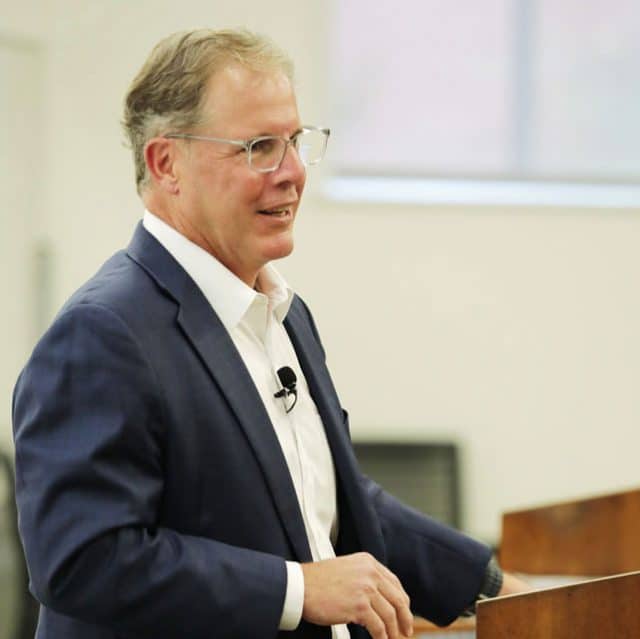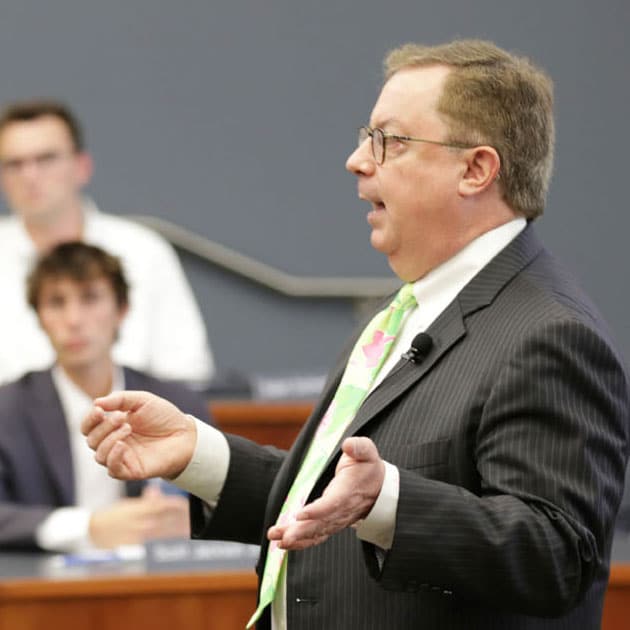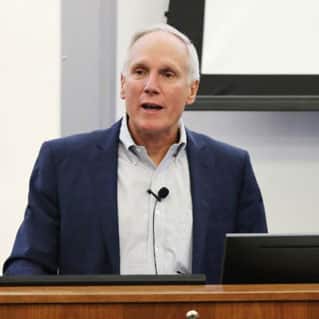Spoken Here: Joe Brady, Brad Case and Chuck Davis
The Alfred A. Ring Distinguished Speaker Series brings real estate leaders to campus to speak with UF real estate students and faculty.

Joe Brady’s career seems a neat progression of always stepping up the next rung of a real estate career ladder at big-name consumer-oriented companies, like T-Mobile and Walgreens. But there were steps down, too. His path rose in 1996 when he helped open 200 Hollywood Video stores. (Raise your hand if you’ve heard of these dinosaurs that rented videos before Netflix?) After he was out of a job, he co-founded a firm that rode the retail cell phone wave, doing deals for Deutsch Telecom, which led to opening 2,000 stores for what is now T-Mobile. Later, Brady held senior roles at real estate giant JLL, including heading its retail and banking industry groups, and then in 2016, he joined Walgreens, where he led real estate operations and oversaw a 150 million-square-foot portfolio. Walgreens was a relic, astoundingly managing its 9,000-store empire using Excel spreadsheets. Brady introduced a proper computer dashboard, and used the fresh operational insights to restructure tons of leases and save the company loads of money. His next rung: The Instant Group, a London-based company that pioneered an Airbnb-style platform used by remote office workers, where he served as CEO Americas.
Brady relocated to Florida during the post-COVID pandemic wave, and he has become a leading voice and author on “the future of work.” With office vacancies at an all-time high in some markets, a big question is how to lure more employees to the office. It’s not by doing business as usual; the work-from-home trend is here to stay. The office of the future is “not a cubicle farm. I view it as a gathering place,” Brady said in his Aug. 31 presentation. “It has to be a workplace experience that is part of a company’s HR strategy. Employees are the new consumer.”

Brad Case is nothing if not a big data guy as chief economist at Tysons Corner, Va.-based Middleburg Communities. But first, some background: Case has a Ph.D. in economics from Yale, where he worked with Nobel prize-winning economist Robert Shiller. (Yes, the Case-Shiller Home Price Index guy.) Before joining Middleburg, he was an economist at Fannie Mae, the National Association of REITs (Nareit) and the Federal Reserve Board. Today, he is something of a lone wolf. “It’s very rare for a company like us to have an economist,” he said in his Sept. 28 presentation. He is an economics switch hitter at Middleburg, which has built 24,000 housing units nationwide. Every month he provides a macroeconomic forecast to his senior management team. His latest forecast differs from what many others predict — that we’re headed for a recession. Case’s analysis: nope. But the area where he really makes a splash is his microeconomic work crunching an ocean of data — household formations, employment growth, vacancy rates and more. This helps Middleburg pinpoint the best opportunities to open an apartment or build-to-rent cottage community that appeals to its core market of 25- to 35-year-olds in the eight Southeast states it serves. “What we want to do better than anybody else is forecast demand,” he said.

Chuck Davis, who recently retired as managing director of MetLife Real Estate Investments Management, opened the fire hose to share insights he’s gained during his long career in real estate. Davis started at Trammell Crow, where he specialized in acquiring apartments. He went on to serve more than 30 years in many aspects of the real estate investment business, including as a vice president with Bank of America in its Real Estate Banking Group focusing on construction lending. At MetLife his success can be told by impressive numbers: He was involved in over $8 billion in mortgage originations and over $4 billion of equity investments including acquisitions, dispositions, leasing and development. Davis advised students to take advantage of new technology, which has the potential to make real estate even more efficient and profitable. New tools like “prop tech” and artificial intelligence will transform the property business. “Pay attention to AI,” he said during his Oct. 5 talk. “That’s going to be the future.” Find recordings of Ring speaker presentations online at warrington.ufl.edu/real-estate-center/ring-speaker-series.
Photo credit: Ben Simons